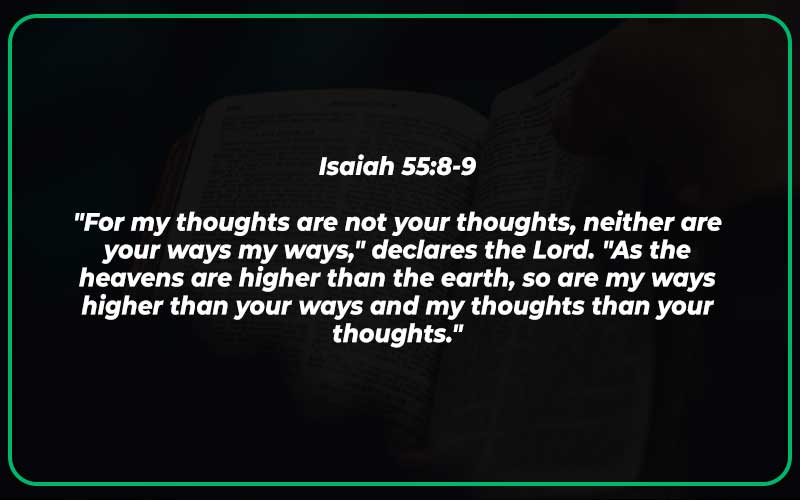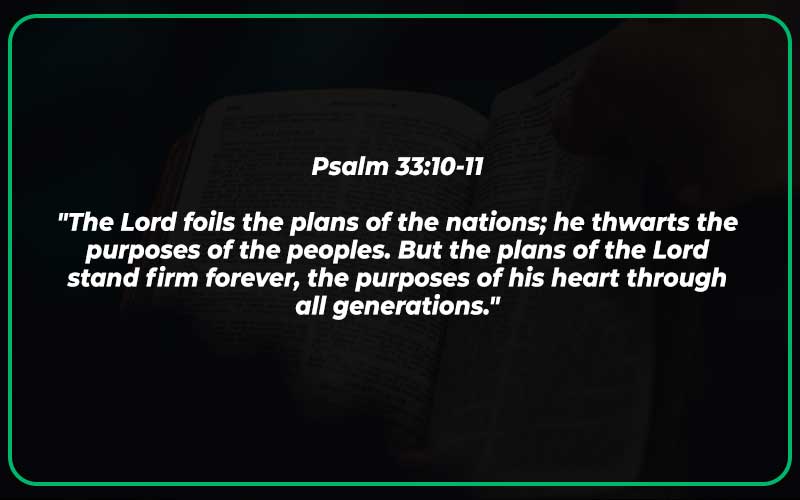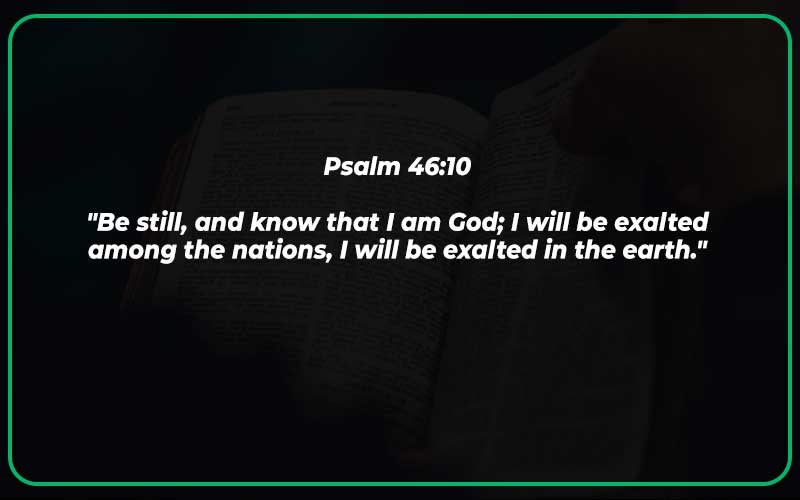Throughout history, humans have grappled with the tension between our limited abilities and the limitless power of God. Join me on a thought-provoking journey as we explore Bible verses that delve into the concept of man’s limitations and God’s sovereignty.
These verses offer insight into the human condition, humility, and our need for divine guidance. Together, let’s reflect on the balance between our human nature and the awe-inspiring majesty of our Creator.
Bible Verses About Man vs. God
Isaiah 55:8-9
“For my thoughts are not your thoughts, neither are your ways my ways,” declares the Lord. “As the heavens are higher than the earth, so are my ways higher than your ways and my thoughts than your thoughts.”
In this verse, God reminds us that His ways and thoughts are beyond our comprehension. It emphasizes the vast difference between human understanding and God’s infinite wisdom. As finite beings, we must acknowledge our limitations and trust in God’s perfect understanding, even when His plans and actions may seem mysterious to us.

Proverbs 14:12
“There is a way that appears to be right, but in the end, it leads to death.”
This verse serves as a reminder that our human understanding can be flawed. We may think certain paths or actions are right, but without God’s guidance, they can ultimately lead to destruction. It emphasizes the importance of seeking God’s wisdom and aligning our lives with His truth, rather than relying solely on our own limited understanding.
Job 38:4
“Where were you when I laid the earth’s foundation? Tell me, if you understand.”
In this verse, God questions Job about his knowledge and involvement in the creation of the world. It highlights the vast difference between God’s knowledge and understanding compared to that of humans. It humbles us, reminding us of our limited perspective and urging us to trust in God’s sovereignty and wisdom.
Romans 9:20
“But who are you, a human being, to talk back to God? Shall what is formed say to the one who formed it, ‘Why did you make me like this?'”
This verse emphasizes our position as created beings in relation to God, the Creator. It reminds us that we have no right to question or challenge God’s plans and purposes. Instead, we should approach Him with humility and reverence, acknowledging His authority and wisdom in all things.
Isaiah 45:9
“Woe to those who quarrel with their Maker, those who are nothing but potsherds among the potsherds on the ground. Does the clay say to the potter, ‘What are you making?'”
Here, God uses the analogy of a potter and clay to illustrate the futility of questioning His plans and actions. Just as clay has no authority over the potter, we, as mere creations, should not question God’s sovereignty and wisdom. It reminds us to submit ourselves to His divine authority and trust that His ways are perfect.
Psalm 118:8
“It is better to take refuge in the Lord than to trust in humans.”
This verse emphasizes the superiority of placing our trust in God rather than relying solely on human understanding or assistance. It recognizes the limitations and fallibility of human beings and encourages us to seek refuge and guidance in God, who is unchanging, faithful, and all-knowing.
Proverbs 3:5-6
“Trust in the Lord with all your heart and lean not on your own understanding; in all your ways submit to him, and he will make your paths straight.”
These verses remind us to place our complete trust in God, rather than relying solely on our own limited understanding. It encourages us to surrender our ways and plans to Him, acknowledging His supreme wisdom and guidance. By doing so, we can experience His direction and faithfulness in our lives.
Job 12:13-14
“To God belong wisdom and power; counsel and understanding are his. What he tears down cannot be rebuilt; those he imprisons cannot be released.”
In these verses, Job acknowledges God’s authority and wisdom. It highlights the contrast between God’s power and our human limitations. It emphasizes that what God determines cannot be altered by human efforts. It reminds us to recognize God’s sovereignty and to trust in His perfect wisdom, even when circumstances seem uncertain or beyond our control.
Psalm 139:1-4
“You have searched me, Lord, and you know me. You know when I sit and when I rise; you perceive my thoughts from afar. You discern my going out and my lying down; you are familiar with all my ways. Before a word is on my tongue you, Lord, know it completely.”
These verses express the all-knowing nature of God. They emphasize that He intimately knows every aspect of our lives, including our thoughts, actions, and words. It reminds us of the futility of trying to hide anything from God, as He sees and understands it all. It encourages us to approach Him with honesty and surrender, knowing that He already knows us deeply.
Job 42:2
“I know that you can do all things; no purpose of yours can be thwarted.”
In this verse, Job acknowledges God’s unlimited power and sovereignty. It recognizes that God’s purposes are unshakeable and cannot be hindered by any human or circumstance. It serves as a reminder of God’s faithfulness and His ability to accomplish His plans despite any obstacles or challenges we may face.
Isaiah 45:7
“I form the light and create darkness, I bring prosperity and create disaster; I, the Lord, do all these things.”
This verse highlights God’s control over all aspects of creation, including both positive and negative circumstances. It reminds us that God is the ultimate source of all things and that His ways are higher than ours. It challenges us to trust in His sovereignty, even in times of difficulty or uncertainty.
Jeremiah 10:23
“Lord, I know that people’s lives are not their own; it is not for them to direct their steps.”
This verse acknowledges the limitations of human beings in directing their own paths and making wise choices. It recognizes that our lives are ultimately under God’s guidance and authority. It encourages us to surrender our will to His leading and trust in His wisdom to direct our steps.
Psalm 8:3-4
“When I consider your heavens, the work of your fingers, the moon and the stars, which you have set in place, what is mankind that you are mindful of them, human beings that you care for them?”
These verses express wonder and humility at the vastness of God’s creation and His care for humanity. It highlights the immense difference between the greatness of God and the insignificance of human beings in comparison. It invites us to marvel at God’s love and concern for us and to approach Him with awe and gratitude.
Romans 11:33-34
“Oh, the depth of the riches of the wisdom and knowledge of God! How unsearchable his judgments, and his paths beyond tracing out! ‘Who has known the mind of the Lord? Or who has been his counselor?'”
These verses exclaim the unfathomable depth of God’s wisdom and knowledge. They emphasize the incomprehensibility of His judgments and the inability of any human to fully understand His ways. It reminds us of the vast difference between our finite minds and God’s infinite understanding. It prompts us to approach God with reverence and humility, acknowledging His supreme wisdom.
Isaiah 40:28
“Do you not know? Have you not heard? The Lord is the everlasting God, the Creator of the ends of the earth. He will not grow tired or weary, and his understanding no one can fathom.”
This verse declares the eternal nature of God and His limitless understanding. It emphasizes that God never grows tired or weary, and His wisdom is beyond human comprehension. It encourages us to trust in the unchanging and all-knowing nature of God, recognizing that He is fully capable of handling any situation or challenge we may face.
Job 11:7-8
“Can you fathom the mysteries of God? Can you probe the limits of the Almighty? They are higher than the heavens above—what can you do? They are deeper than the depths below—what can you know?”
In these verses, Job poses rhetorical questions that highlight the impossibility of fully understanding or comprehending God’s mysteries and wisdom. It reminds us of the vast difference between our limited understanding and the boundless knowledge of the Almighty. It humbles us, calling us to acknowledge our dependence on God and His infinite wisdom.
1 Corinthians 1:25
“For the foolishness of God is wiser than human wisdom, and the weakness of God is stronger than human strength.”
This verse contrasts the wisdom and strength of God with the wisdom and strength of humans. It highlights the superiority of God’s wisdom and power, even when they may seem foolish or weak from a human perspective. It challenges us to humble ourselves and recognize the limitations of our own understanding, trusting instead in God’s surpassing wisdom and strength.
Psalm 33:10-11
“The Lord foils the plans of the nations; he thwarts the purposes of the peoples. But the plans of the Lord stand firm forever, the purposes of his heart through all generations.”
These verses affirm God’s sovereignty over the plans and purposes of humanity. They emphasize that God’s plans will ultimately prevail, while human plans may be frustrated or altered. It reminds us that God’s purposes are unshakable and His intentions will endure throughout all generations. It prompts us to align ourselves with His plans and trust in His unfailing wisdom.

Proverbs 16:9
“In their hearts humans plan their course, but the Lord establishes their steps.”
This verse acknowledges the inclination of humans to make plans and chart their own paths. However, it also reminds us that ultimately, it is God who directs and establishes our steps. It encourages us to seek His guidance and surrender our plans to His leading, trusting that He knows what is best for us.
Also Read: What Does the Bible Say About Abusing Children (25 Bible Verses)
Isaiah 64:8
“Yet you, Lord, are our Father. We are the clay, you are the potter; we are all the work of your hand.”
In this verse, Isaiah uses the analogy of a potter and clay to illustrate our relationship with God. It emphasizes that He is the Creator and we are His creation. Just as a potter molds clay according to his will, we are called to submit ourselves to God’s wise and sovereign plans. It reminds us to trust in His craftsmanship and allow Him to shape our lives according to His purpose.
Job 36:22
“God is exalted in his power. Who is a teacher like him?”
These words acknowledge the supreme power and authority of God. They recognize that no human can compare to Him as a teacher or an instructor. It highlights the uniqueness of God’s wisdom and the inability of humans to fully grasp or replicate it. It prompts us to humble ourselves before God and to seek His instruction and guidance in all areas of life.
Jeremiah 29:11
“For I know the plans I have for you,” declares the Lord, “plans to prosper you and not to harm you, plans to give you hope and a future.”
This well-known verse reminds us of God’s loving and intentional plans for our lives. It reassures us that His plans are for our well-being, offering hope and a future. It encourages us to trust in His faithfulness, even when we may face difficulties or uncertainties. It reminds us that God’s plans always align with His goodness and purposes.
Proverbs 19:21
“Many are the plans in a person’s heart, but it is the Lord’s purpose that prevails.”
This verse acknowledges the tendency of humans to make plans and have desires. However, it emphasizes that ultimately, it is God’s purpose that will prevail. It reminds us of the need to align our hearts and desires with God’s will, recognizing His ultimate authority over our lives. It encourages us to trust in His guidance and surrender our plans to His sovereign purposes.
Isaiah 41:10
“So do not fear, for I am with you; do not be dismayed, for I am your God. I will strengthen you and help you; I will uphold you with my righteous right hand.”
This verse offers comfort and assurance in the midst of challenges or struggles. It reminds us that God is always present with us, offering strength, help, and support. It encourages us to cast away fear and discouragement, trusting in the steadfastness of God’s love and His ability to sustain us. It prompts us to rely on His strength and guidance in every situation.
Proverbs 21:30
“There is no wisdom, no insight, no plan that can succeed against the Lord.”
This verse emphasizes the invincibility of God’s wisdom and plans. It declares that no human wisdom, insight, or scheme can stand against the Lord’s purposes. It reminds us of the futility of opposing God’s will and encourages us to align ourselves with His divine wisdom. It instills confidence in God’s ultimate victory and calls us to trust in His sovereign power.
Psalm 46:10
“Be still, and know that I am God; I will be exalted among the nations, I will be exalted in the earth.”
In this verse, God calls us to be still and acknowledge His sovereignty and majesty. It invites us to pause, let go of our worries and concerns, and trust in His supreme authority. It reminds us that God will ultimately be exalted and glorified, regardless of the circumstances we face. It encourages us to surrender control to Him and find peace in knowing that He is God.

What does the Bible say About Man vs. God?
The Bible addresses the relationship between humanity and the Divine in various ways. It emphasizes that humans are created in the image of God (Genesis 1:27), imbuing them with dignity, purpose, and moral responsibility. However, it also underscores the vast difference between finite, fallible humans and the infinite, omnipotent God.
Throughout the Scriptures, there’s a consistent theme of humans struggling with their limitations and often trying to assert their independence from God. This can be seen in stories like Adam and Eve’s disobedience in the Garden of Eden (Genesis 3) and the Tower of Babel (Genesis 11), where humans sought to elevate themselves to the level of God.
Yet, the Bible also teaches that true fulfillment and purpose come from aligning one’s life with God’s will. It encourages humility and submission before God, recognizing His sovereignty and wisdom. This submission is often portrayed as the path to peace, righteousness, and eternal life.
The Bible further emphasizes that despite human failings, God’s love and mercy are boundless. It offers the promise of redemption and reconciliation through faith, allowing humans to bridge the gap between their flawed nature and the perfection of God.
In summary, the Bible portrays a dynamic relationship between humanity and the Divine, highlighting the tension between human free will and God’s providence. It underscores the importance of acknowledging God’s supreme authority while also celebrating the unique value and potential within each individual.

